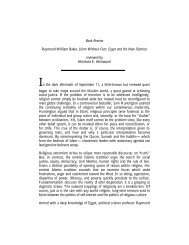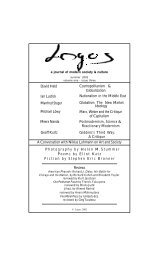Michael J. Thompson Stephen Eric Bronner Wadood Hamad - Logos
Michael J. Thompson Stephen Eric Bronner Wadood Hamad - Logos
Michael J. Thompson Stephen Eric Bronner Wadood Hamad - Logos
You also want an ePaper? Increase the reach of your titles
YUMPU automatically turns print PDFs into web optimized ePapers that Google loves.
Stanley Aronowitz<br />
dormant Puerto Rican independence movement revived under Marxist<br />
leadership which closely identified with the Cuban revolution. In the 1970s,<br />
Maurice Bishop organized a successful uprising in Grenada which openly<br />
aligned itself with the Cuban revolution and <strong>Michael</strong> Manley’s democraticallyelected<br />
left social-democratic government in Jamaica forged close ties with<br />
Cuba. However much he was smitten, Mills framed much of his own<br />
discourse in terms of the significant of these events for America’s neo-colonial<br />
foreign policy and for America’s future. Lacking the tools of discriminating<br />
evaluation, many young radicals not only gave their unconditional support but<br />
enlisted as volunteers in Grenada, Cuba and Nicaragua’s education and health<br />
efforts.<br />
IV<br />
Mills is both an exhilarating exemplar of the role and reach of the public<br />
radical intellectual, and at the same time, a sobering reminder of how far the<br />
human sciences have descended since the end of the Vietnam War. For even in<br />
death Mills was an inspiration to a generation of young intellectuals estranged<br />
from the suburban nightmare of post-World War II America and eager to<br />
shape their own destiny, and to some in his own generation who, in fear and<br />
trembling, had withdrawn from public involvement, but yearned to return.<br />
The decline of social engagement and political responsibility that accompanied<br />
the ebbing of the impulse to reform and revolution in the 1970s and 1980s,<br />
witnessed the shift of labor, socialist and social liberal parties and movements<br />
to the liberal center. Many erstwhile radical intellectuals who retained their<br />
public voice moved steadily to the right, motivated, they said, by the<br />
authoritarianism of the New as well as the Old Left, and by their conviction<br />
that American capitalism and its democratic institutions were the best of all<br />
possible worlds.<br />
He suffered the sometimes scorching rebuke of his contemporaries and, even as<br />
he won the admiration of the young as well as the tattered battalions of left<br />
intellectuals, had severed his ties with much of the liberal center which sorely<br />
needed to hear his argument that, in face of the awesome and almost complete<br />
hegemony of the power élite, American democratic institutions were in a state<br />
of almost complete meltdown. That recently a small body of scholars have<br />
revisited his legacy should be welcomed. The question of whether intellectuals<br />
<strong>Logos</strong> 2.3 – Summer 2003




